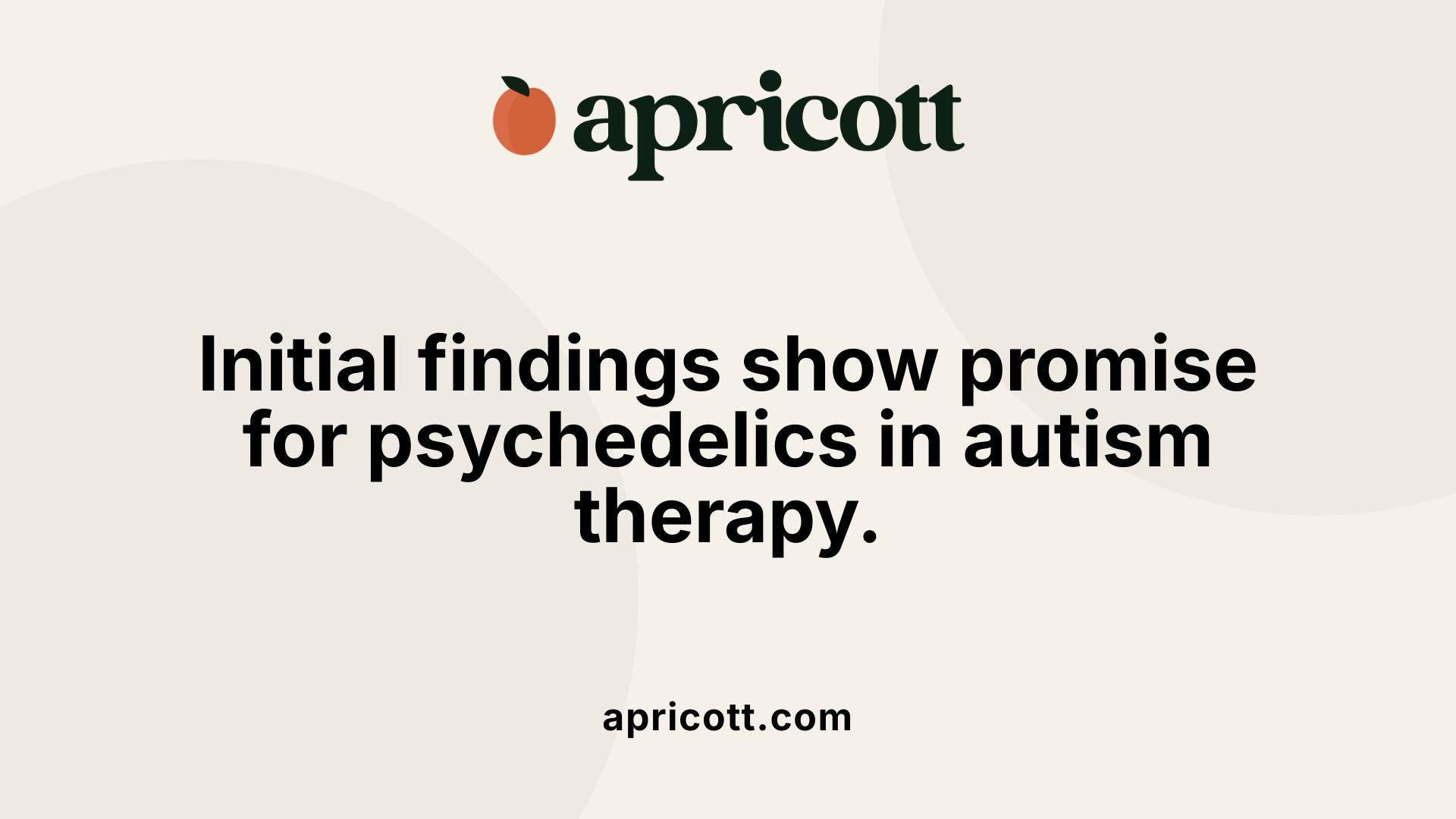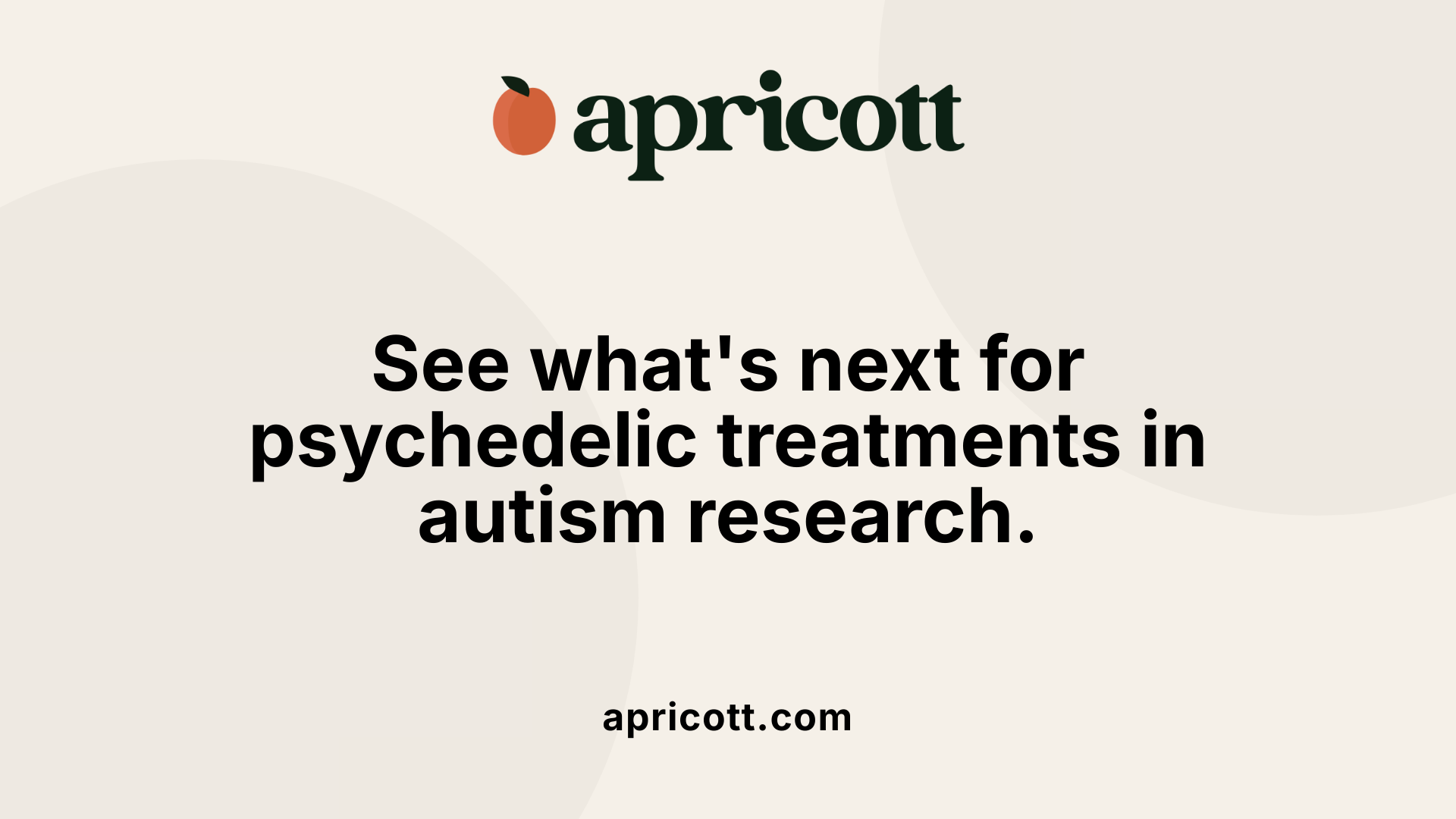December 2, 2025
Exploring Psychedelic Research and Applied Behavior Analysis in Autism Support
As the landscape of autism support broadens, combining established methods like Applied Behavior Analysis (ABA) with emerging psychedelic research is opening new avenues for understanding and improving behavioral and mental health outcomes. This article delves into the role of ABA in autism intervention before exploring the potential and ongoing research of psychedelics such as LSD, MDMA, and psilocybin in addressing psychological distress and social anxiety among autistic individuals.

Applied behavior analysis (ABA) therapy is a highly evidence-based treatment approach designed to improve specific behaviors, particularly in individuals with autism spectrum disorder. It applies principles from behavior analysis focused on learning and motivation to systematically teach new skills.
ABA breaks down complex abilities into small, manageable steps, teaching them using proven techniques like reinforcement, shaping, chaining, and modeling. This method ensures gradual learning that is measurable and adaptable to the individual's needs.
At the core, ABA depends on understanding how behaviors are influenced by their consequences. Positive behaviors are encouraged through reinforcement, which could be praise, rewards, or preferred activities. Shaping involves reinforcing successive approximations towards a desired behavior, while chaining links simpler behaviors into complex sequences.
ABA therapy programs are highly individualized. They begin with thorough assessments to determine the person's strengths and areas needing support. Based on this, specific goals are set—these could range from language development and social interaction to daily living skills and reducing challenging behaviors.
The therapy can be intensive, often involving many hours weekly, or focused for shorter durations depending on individual requirements. Continuous progress monitoring helps therapists adjust strategies to maximize effectiveness.
ABA is versatile and applied across various environments to ensure therapy goals are relevant and transferable. Common settings include the home, schools, specialized clinics, and community spaces. This flexible approach allows skills learned in one setting to generalize to others, supporting functional independence and social integration.

ABA therapy plays a crucial role in helping individuals with autism learn new skills. By using structured techniques such as positive reinforcement, therapists encourage desired behaviors and skill acquisition. This approach targets areas like communication, social interaction, self-care, and academic abilities, helping individuals develop essential competencies.
One of the primary goals of ABA therapy is to reduce challenging behaviors that may interfere with learning and daily life. By analyzing antecedents, behaviors, and consequences, ABA therapists identify patterns and implement strategies to decrease problematic behaviors while promoting positive alternatives.
ABA therapy is highly personalized to meet each individual's unique needs. Goals are tailored based on specific strengths and challenges, with family members often involved to reinforce skills across environments. This collaboration ensures consistency and supports generalization of learning.
Improving communication and daily living skills is central to ABA treatment. Early and intensive interventions focus on teaching language skills and self-care routines, which enhance independence and social functioning. These skills empower individuals to engage more fully in their communities.
Qualified behavior analysts oversee ABA programs and closely monitor progress through systematic data collection. This allows for ongoing assessment of intervention effectiveness and timely adjustments to strategies, ensuring the therapy remains responsive to the individual's evolving needs.
Together, these components enable ABA therapy to empower individuals with autism, fostering greater independence, social inclusion, and self-advocacy while honoring their individuality and potential.

This technique involves rewarding desired behaviors to increase their frequency. It can include praise, tokens, or access to preferred activities, making learning motivating and enjoyable.
Task analysis breaks complex skills into smaller, simpler steps. This method allows learners to master each component progressively, making challenging tasks more approachable.
DTT is a structured instructional approach involving repeated teaching trials. Each trial has a clear beginning and end, with prompts and reinforcements used to teach specific skills efficiently.
NET promotes learning through natural play and everyday routines. By embedding teaching moments in real-life contexts, this method helps children apply skills spontaneously across various settings.
PRT focuses on pivotal areas such as motivation and self-management. Enhancing these areas has widespread effects on other behaviors, supporting general improvement in communication and social skills.
Prompts guide learners toward correct responses, gradually reduced over time (fading) to encourage independence and reduce reliance on assistance.
Systematic recording of behaviors and progress allows therapists to monitor effectiveness and tailor interventions. Ongoing assessment ensures strategies meet the individual's evolving needs.
ABA therapy is delivered by a team of trained specialists, each with distinct roles and levels of responsibility. At the top are Board-Certified Behavior Analysts (BCBAs) and their doctoral-level counterparts, BCBA-Ds. These professionals assess clients, develop individualized treatment plans, and oversee the entire therapy process.
Supporting BCBAs, Board Certified Assistant Behavior Analysts (BCaBAs) assist with clinical tasks like conducting assessments and helping tailor treatments. They work under the supervision of BCBAs to ensure effective care.
At the frontline of therapy are Registered Behavior Technicians (RBTs). These paraprofessionals implement behavior intervention plans directly with clients and must demonstrate proficiency in specific behavioral techniques. They work closely with their supervising analysts to carry out prescribed strategies.
To practice, BCBAs typically hold a master’s degree in behavior analysis or related fields, complete rigorous supervised fieldwork, and pass a comprehensive certification exam. BCaBAs usually have a bachelor’s degree and fulfill similar supervised training and certification standards.
RBTs require a minimum of a high school diploma or equivalent, complete specialized training and competency assessments, and maintain certification through ongoing supervision.
Supervision is crucial within ABA therapy delivery. BCBAs are responsible for ongoing oversight, ensuring treatment fidelity and making necessary adjustments. BCaBAs and RBTs operate under this supervision, collaborating closely to maximize treatment effectiveness and client progress.
This tiered professional structure ensures that clients receive expert-designed interventions paired with hands-on application by qualified technicians, all grounded in scientific principles and ethical standards.

Recent research offers promising insights into the potential benefits of psychedelics for autism-related psychological distress. A survey involving 233 autistic individuals revealed that 82% experienced a reduction in psychological distress after engaging with impactful psychedelic experiences. Similarly, 78% of participants reported a decrease in social anxiety, highlighting the potential of these therapies to improve core emotional and social challenges faced by many autistic people.
The most compelling data come from studies involving MDMA-assisted therapy, especially for social anxiety, which is common among autistic adults. In a 2018 pilot study, 12 autistic adults with severe social anxiety were treated with MDMA alongside talk therapy. This approach led to rapid and lasting improvement in anxiety symptoms, with benefits persisting for at least six months. These results underscore the potential for psychedelics to produce durable mental health improvements.
The success of the MDMA pilot study provides a foundation for future research and clinical applications. It suggests that this combined therapeutic model may be particularly effective for individuals struggling with social anxiety unresponsive to traditional treatments. These outcomes also encourage ongoing and future clinical trials to further understand and validate MDMA's role in enhancing quality of life for autistic adults.
This emerging body of evidence highlights the promise of psychedelic therapies in addressing psychological and social challenges in autism. Continued research, including well-designed clinical trials, will be essential to expand these initial findings and safely integrate psychedelics into autism-related mental health care.
At King’s College London, researchers are leading an important study into how low-dose psilocybin affects autistic adults compared to nonautistic adults. This study employs cutting-edge techniques such as sensory-processing tests, electroencephalography (EEG), and magnetic resonance imaging (MRI) to observe biological responses. The goal of this research is to generate solid neuroscience-based insights to support autistic individuals considering the use of psychedelics.
Looking ahead, clinical trials are being planned to further explore psychedelic-assisted therapies tailored to autistic individuals. One trial will examine MDMA-assisted therapy targeting social anxiety symptoms specifically in autistic young adults. Social anxiety is a common challenge in autism, and prior pilot studies suggest MDMA combined with talk therapy can offer rapid and lasting symptom relief.
Another important area for future research involves psilocybin-assisted therapy for autistic adults with treatment-resistant depression. This form of therapy holds promise given psilocybin's growing recognition as a powerful agent in mental health treatment, especially for conditions not easily addressed by traditional approaches.
These ongoing and planned studies build a growing body of scientific exploration into how psychedelics might be safely and effectively integrated into personalized care for autistic individuals, particularly focusing on mental health challenges uncommon in conventional treatment paradigms.
Psychedelic research involving autistic individuals faces several significant challenges. A primary limitation is that most studies focus exclusively on autistic adults without intellectual disabilities. This selection criterion arises because participants must provide informed consent and fully understand the implications of the treatment. Consequently, this restricts the generalizability of findings to the broader autistic community, particularly those with intellectual disabilities who might also benefit from therapeutic interventions.
Another crucial consideration is ensuring that participants comprehend the nature of the psychedelic treatment and associated risks. Ethical research requires transparency and clear communication about potential effects, emphasizing the importance of respecting autonomy and informed decision-making.
Variability in study design and participant characteristics further complicates the picture. Differences in dosage, therapy modalities, and outcome measurements can lead to inconsistent results across studies. These variations underline the need for standardized protocols and cautious interpretation of data.
Balancing scientific rigor with ethical priorities is essential in advancing psychedelic research within autistic populations. Protecting vulnerable individuals while expanding understanding demands ongoing ethical scrutiny and adaptive research frameworks to ensure treatments are both safe and effective.
Between the 1950s and 1970s, LSD was extensively researched as a potential psychiatric treatment. During this period, it was explored for its effects on a range of mental health issues, including anxiety, depression, psychosomatic diseases, and various forms of addiction. This body of research laid foundational knowledge about the potential therapeutic benefits of psychedelics in psychiatric care.
Clinical trials focused on LSD’s effectiveness for multiple conditions. Most notably, many studies targeted alcoholism, where LSD showed promising results in reducing drinking behavior and supporting abstinence. Beyond addiction, LSD demonstrated potential in alleviating neurotic symptoms such as anxiety and depression. It was also investigated for its benefits in treating anxiety related to life-threatening illnesses and heroin use disorder, illustrating its broad scope in psychiatric applications.
Historically, LSD was administered to 567 patients in doses ranging from 20 to 800 micrograms. The primary method of administration was oral, although some studies used intravenous routes. This wide dosing range helped researchers assess both the safety and the therapeutic potential of varied LSD doses. The heterogeneity in dosing and trial design affected how results were interpreted but contributed valuable data for future research.
LSD was historically studied from the 1950s to the 1970s for treatment of psychiatric conditions including anxiety, depression, psychosomatic diseases, and addiction. It was tested primarily through oral administration, at doses between 20 and 800 micrograms, with additional trials using intravenous methods. These pioneering studies paved the way for contemporary psychedelic research by documenting both positive therapeutic outcomes and challenges associated with LSD therapy.
A thorough modern systematic review has examined 11 controlled and randomized clinical trials focused on LSD’s use in psychiatric treatment. These studies primarily explored LSD’s effects on alcoholism but also investigated other mental health conditions. Despite differences in how the trials were conducted, consistent positive effects emerged, especially for alcohol use disorder.
The strongest and most reliable evidence highlights LSD’s role in treating alcoholism. In these trials, LSD was administered at doses ranging from 20 to 800 micrograms, mostly orally, with some intravenous applications. Findings demonstrated significant improvements in patients’ abstinence rates and drinking behaviors, suggesting LSD can play a beneficial role in managing alcohol addiction.
Beyond alcoholism, LSD showed promise in alleviating neurotic symptoms like anxiety and depression. Additionally, it exhibited potential therapeutic effects for heroin use disorder and anxiety associated with life-threatening illnesses. While these results are promising, they tend to reflect short-term improvements; some studies noted that long-term effects sometimes converge with those of control groups.
Research indicates that positive therapeutic outcomes are often linked to the quality of the psychedelic experience, including mystical or peak experiences during LSD sessions. Factors such as dosage, psychological state ('set'), and environment ('setting') also influence treatment efficacy. Recent neuroimaging studies further support LSD’s impact on brain connectivity, which may underpin its therapeutic benefits.
Most clinical trials investigating LSD’s use in psychiatric treatment report positive changes in symptoms in the short term. Patients often experience relief from conditions such as alcoholism, anxiety, depression, and drug dependence shortly after treatment sessions.
However, the long-term durability of these improvements varies. Some studies demonstrate that the initial benefits of LSD-assisted therapy tend to diminish over time, with patient outcomes gradually aligning more closely with those seen in control groups. This convergence suggests that while LSD can offer rapid and significant symptom relief, sustaining these gains may require additional interventions or repeated sessions.
The variability in long-term effects highlights the complexity of psychedelic-assisted treatments. Factors such as dosage, psychological state during treatment ("set"), environment ("setting"), and the occurrence of profound, mystical-type experiences during sessions can influence how enduring the therapeutic benefits are.
Consequently, although LSD shows promise as a tool for short-term symptom management, ongoing research is needed to better understand how to maintain its therapeutic benefits over longer periods and for diverse patient populations.
Positive outcomes in LSD therapy are strongly linked to several interconnected factors. Central among these are mystical or peak experiences during the LSD session. These profound experiences often correspond with meaningful psychological insights that contribute to the long-term therapeutic benefits.
These experiences are reported as deeply transformative, involving feelings of unity, transcendence, and profound personal insight. Research consistently finds that patients who undergo such peak experiences tend to have better and more lasting improvements, particularly in psychiatric conditions like alcoholism and anxiety.
Dosage plays a critical role in shaping the therapy's effectiveness. Studies have administered doses ranging widely from 20 to 800 micrograms. Higher doses increase the likelihood of inducing peak experiences, but must be balanced with safety and tolerability considerations.
The individual's mental state, attitudes, and expectations before taking LSD — referred to as "set" — significantly impact the experience. A positive, prepared mindset can help facilitate meaningful and therapeutic journeys, whereas anxiety or fear may hinder beneficial outcomes.
Similarly, the physical and social surroundings, or "setting," are crucial. A supportive, calm, and controlled environment encourages safety and openness, enhancing the chances of positive responses. This underscores the importance of well-designed clinical settings for therapy.
Together, these factors—mystical experiences, dose, set, and setting—form the foundation for optimizing LSD-assisted therapies, enhancing the potential for lasting mental health improvements.
Conducting double-blind placebo-controlled trials with LSD presents unique difficulties primarily because of the drug's strong psychoactive effects. Participants and researchers can often distinguish whether LSD or a placebo has been administered, which undermines the blinding essential to such study designs. This challenge complicates unbiased assessment of LSD's therapeutic effects.
To address these issues, some studies employ active placebos—substances given at low doses that produce mild effects. These active placebos help make the study more credible by partly masking whether the actual LSD dose or placebo was administered. However, this approach is not perfect and adds layers of complexity to trial design and interpretation.
Consequently, the reliability of LSD studies can be affected, as subtle biases may influence outcomes. Researchers must carefully design protocols to balance scientific rigor with the practical realities of LSD's psychoactive profile, often limiting the scope and scale of robust controlled trials.
The ongoing refinement of these methods is critical to advancing understanding of LSD's therapeutic potential while maintaining strong evidence standards.
Recent neuroimaging studies have illuminated the underlying brain changes connected to LSD’s therapeutic benefits. Key findings show that LSD decreases modularity in brain networks, meaning the brain's distinct functional regions become less isolated from each other. This reduced segregation allows for greater interaction and communication between different parts of the brain.
Simultaneously, LSD increases global brain connectivity. Rather than being confined to specific localized areas, brain activity becomes more widespread and integrated across multiple regions. This broad connectivity may facilitate new ways of processing emotions and cognition, which is thought to contribute to symptom improvements.
These shifts in brain organization suggest that LSD temporarily disrupts habitual brain patterns, allowing individuals to break free from fixed negative thought cycles and rigid emotional responses. This mechanism aligns with the reported positive therapeutic outcomes in conditions such as anxiety, depression, and substance use disorders.
Together, the decreased modularity and enhanced global connectivity form a neural basis for LSD's potential in mental health treatment by fostering mental flexibility and emotional plasticity.
Research has demonstrated a strong link between mystical-type experiences during LSD sessions and positive long-term therapeutic outcomes. These experiences often involve profound feelings of unity, transcendence, and altered perception, which can lead to shifts in emotional and cognitive processing.
The significance of these experiences lies in their ability to enhance psychological insight and foster a sense of connectedness, which can be crucial for treating psychiatric conditions such as anxiety, depression, and addiction. Patients who report such peak experiences during LSD therapy are more likely to show sustained improvements beyond the immediate treatment period.
Mystical experiences appear to act as a catalyst for enduring change, promoting deeper emotional engagement and the restructuring of maladaptive thought patterns. This has been observed in several clinical trials, where the intensity and quality of the mystical experience predicted better outcomes and longer-lasting benefits.
Given their importance, modern treatment protocols aim to create conditions that support the emergence of mystical experiences. Factors such as the dose of LSD, the psychological 'set' of the patient, and the physical and social 'setting' during the session are carefully controlled to maximize the likelihood of these profound experiences.
Clinicians incorporate preparatory and integrative therapies to help patients process and make meaningful use of these experiences, which contributes to the overall success of the therapeutic intervention.
Psychedelic-assisted therapy shows promise in complementing Applied Behavior Analysis (ABA) by targeting psychological distress and social anxiety, two challenges not fully addressed by ABA alone. Recent studies highlight that 82% of autistic individuals reported reduced psychological distress and 78% experienced less social anxiety following impactful psychedelic experiences. This contrasts with ABA's traditional focus on structured skill-building and behavioral management.
ABA emphasizes observable behaviors and skill acquisition through systematic reinforcement, effectively supporting communication, social skills, and adaptive behaviors. However, it can fall short in alleviating internal struggles such as anxiety or depression. Psychedelic therapy, especially with agents like MDMA and psilocybin, may address these underlying psychological barriers, potentially unlocking greater engagement and receptivity to behavioral interventions.
For example, a 2018 pilot study showed autistic adults with severe social anxiety experienced rapid and lasting symptom improvements after MDMA-assisted therapy combined with talk therapy. Such findings suggest that psychedelics could reduce hindrances that limit ABA's effectiveness, enabling autistic individuals to benefit more from behavioral interventions.
Integrating psychedelics with ABA could offer a multidimensional therapeutic framework addressing both external behaviors and internal mental states. This holistic approach could lead to improved quality of life by concurrently managing social anxiety, psychological distress, and behavioral challenges.
Current research aims to deepen understanding of psychedelic effects in autism, including ongoing trials with psilocybin and MDMA-assisted therapy. While psychedelic research is often limited to autistic individuals without intellectual disabilities due to informed consent requirements, the evolving evidence encourages exploration of combined therapeutic models.
In summary, psychedelic experiences may enhance ABA's benefits by complementing the behavioral focus with psychological relief, fostering more effective and comprehensive autism support.
Personalized therapy recognizes that autism spectrum disorder presents uniquely in every individual. This diversity spans behaviors, cognitive functions, and psychological challenges, making a one-size-fits-all approach ineffective.
By tailoring treatments—ranging from traditional therapies like ABA to emerging psychedelic-assisted options—clinicians can better meet the specific needs of each autistic person. Individualized plans consider the person's strengths, difficulties, and therapy goals, thus enhancing the potential for meaningful improvement.
Moreover, respect for each person’s unique behavioral and psychological profile fosters collaboration between therapists and individuals, ensuring therapies align with personal preferences and comfort levels. This is particularly important given the complex relationship between autism and co-occurring conditions like social anxiety and depression.
With advancing research into psychedelic therapies showing promise but also highlighting variation in response, personalized approaches remain essential. Such customization optimizes treatment effectiveness and supports sustained benefits over time, reflecting the diversity of the autism spectrum.
One of the foremost ethical concerns in autism and psychedelic research is ensuring authentic involvement of autistic voices in the design and implementation of studies. Many research efforts focus primarily on participants without intellectual disabilities, mainly due to the necessity of informed consent and clear understanding of treatment protocols. This raises critical issues about representation, as individuals with more significant challenges may be excluded from research advancements.
Ethical research frameworks emphasize respecting autonomy by allowing participants to make informed decisions about their involvement. This is particularly vital in studies involving psychedelics, where psychological states ('set') and environmental factors ('setting') significantly influence outcomes. Researchers must balance the promise of innovative therapies with safeguarding participants from potential risks.
Incorporating autistic individuals’ perspectives helps tailor studies to better reflect diverse experiences and needs. It also promotes transparency and trust, ensuring that research does not exploit but rather supports the community. Maintaining this balance fosters ethical integrity and enhances the relevance and impact of the findings in real-world autistic populations.

The landscape of psychedelic research in autism is rapidly evolving, with several promising clinical trials on the horizon. Planned studies notably include MDMA-assisted therapy targeting social anxiety in autistic young adults—a population frequently burdened by severe social challenges. Another forthcoming trial will explore psilocybin-assisted therapy aimed at treating resistant depression in autistic adults, an area with significant unmet clinical needs.
These initiatives build on encouraging preliminary findings that suggest psychedelics may reduce psychological distress and social anxiety among autistic individuals. The planned studies strive to establish robust evidence on safety, efficacy, and long-term benefits, providing a clearer clinical framework for psychedelic-assisted interventions.
Social anxiety and depression are prevalent co-occurring conditions in autistic people that often impair quality of life and functional outcomes. The focus on these targets is informed by pilot research, such as a 2018 MDMA trial indicating rapid and durable improvement in social anxiety symptoms coupled with talk therapy.
Addressing these mental health conditions with psychedelic-assisted treatments could offer alternatives where conventional therapies have fallen short. Insights from neuroimaging and sensory processing research help to clarify how psychedelics might affect brain function and symptomology in these areas.
Current research also considers how psychedelic-assisted therapy might integrate with well-established autism interventions. Combining pharmacological approaches like MDMA and psilocybin with behavioral therapies offers a holistic route tailored to autistic individuals’ needs.
This integrated model can optimize social functioning and emotional well-being, supporting autistic individuals beyond symptom management. However, these approaches primarily target autistic persons without intellectual disabilities due to consent complexities.
Such integration emphasizes the importance of personalized treatment plans, balancing new therapies with the strengths of traditional support systems to yield the best outcomes.
Recent studies reveal encouraging outcomes for autistic individuals engaging with psychedelic therapies. A survey of 233 autistic participants found 82% experienced a decrease in psychological distress and 78% reported reduced social anxiety after significant psychedelic experiences. Complementing these self-reports, a 2018 pilot study involving 12 autistic adults with severe social anxiety showed that MDMA combined with talk therapy notably improved symptoms swiftly and effects remained stable for at least six months.
Psychedelic treatments demonstrate promising benefits, especially in reducing social anxiety and possibly aiding depression among autistic individuals. However, research is mostly restricted to those without intellectual disabilities due to the need for informed consent. Studies on substances like LSD historically and presently highlight positive impacts on psychiatric conditions such as alcoholism and neurotic symptoms, but challenges remain in maintaining study rigor. For example, double-blind placebo-controlled trials are complicated by the overt psychoactive effects of psychedelics, though the use of active placebo doses helps address this.
At King’s College London, investigations continue into the biological effects of low-dose psilocybin in autistic and non-autistic adults using sensory tests and brain imaging to build neuroscience-based guidance. Upcoming clinical trials aim to evaluate MDMA-assisted therapy for social anxiety in young autistic adults and psilocybin-assisted therapy for treatment-resistant depression in this population. Insights from neuroimaging studies—for instance, LSD’s influence on brain connectivity—and the importance of therapeutic context suggest that tailored psychedelic interventions could become viable options. Continued rigorous exploration and expanding participant diversity will be key for translating these findings into wider clinical practice.
The evolving research landscape reflects a growing recognition of the complexities surrounding autism spectrum disorder and associated mental health challenges. While Applied Behavior Analysis remains foundational in skill development and behavior modification, emerging psychedelic therapies offer promising avenues for addressing psychological distress and social anxiety among autistic individuals. Ethical, personalized, and evidence-based approaches are paramount to maximizing benefits and minimizing risks. Continued rigorous research and thoughtful integration of these modalities may herald more comprehensive and effective support frameworks, ultimately enhancing quality of life and autonomy for autistic people.